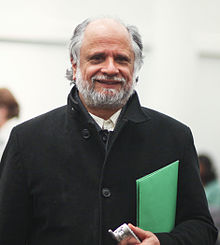
Back هومى ك. بهابها ARZ Хоми Баба Bulgarian Homi K. Bhabha Catalan ھۆمی بابا CKB Homi K. Bhabha Czech Homi K. Bhabha Welsh Homi K. Bhabha Danish Homi K. Bhabha German Homi K. Bhabha Spanish هومی بابا Persian
Homi K. Bhabha | |
|---|---|
 | |
| Born | 1 November 1949 |
| Spouse | Jacqueline Bhabha |
| Children | 3 |
| Academic background | |
| Alma mater | St. Mary's School, Mumbai University of Mumbai Christ Church, Oxford |
| Academic work | |
| School or tradition | Post-colonial theory Post-structuralism |
| Institutions | University of Sussex Princeton University Harvard University |
| Main interests | History of ideas, Literature |
| Notable ideas | Hybridity as a strategy of the suppressed against their suppressors, mimicry as a strategy of colonial subjection, Third Space, postcolonial "enunciative" present[1] |
Homi Kharshedji Bhabha (/ˈbɑːbɑː/; born 1 November 1949) is an Indian scholar and critical theorist. He is the Anne F. Rothenberg Professor of the Humanities at Harvard University. He is one of the most important figures in contemporary postcolonial studies, and has developed a number of the field's neologisms and key concepts, such as hybridity, mimicry, difference, and ambivalence.[2] Such terms describe ways in which colonised people have resisted the power of the coloniser, according to Bhabha's theory. In 2012, he received the Padma Bhushan award in the field of literature and education from the Indian government.[3] He is married to attorney and Harvard lecturer Jacqueline Bhabha, and they have three children.[4]
- ^ Peter Hallward, Absolutely Postcolonial: Writing Between the Singular and the Specific, Manchester University Press, 2001, p. 25.
- ^ Huddart, David. "Homi K. Bhabha", Routledge Critical Thinkers, 2006
- ^ "Padma Awards". pib. 27 January 2013. Retrieved 27 January 2013.
- ^ Eakin, Emily (17 November 2001). "Harvard's Prize Catch, a Delphic Postcolonialist". The New York Times. ISSN 0362-4331. Retrieved 10 March 2019.